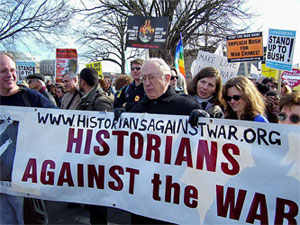
Here’s a letter from two leaders of Historians Against the War, which appeared in the The Chronicle of Higher Education:
From the issue dated February 23, 2007
LETTERS TO THE EDITOR
Historians Against the War
To the Editor:
We wish to amplify your article that described the resolution on civil liberties in wartime adopted at the American Historical Association’s annual meeting in January (“Historians’ Annual Meeting: Controversy and a Glut of Jobs,” The Chronicle, January 19).
The resolution strongly condemns the exclusion of foreign scholars, the reclassification of previously unclassified documents, the obstruction of access to prewar intelligence, and other intrusions on free inquiry. It links these intrusions to the Bush administration’s conduct of the war in Iraq, and it calls upon members of the organization “to do whatever they can to bring the Iraq war to a speedy conclusion.”
After passage by an overwhelming vote at the business meeting, the resolution was accepted by the AHA’s council and is being sent to the general membership for ratification in an electronic ballot to be completed by March 1. We are pleased to note that the resolution has quickly garnered significant support. More than 100 historians have signed on, including two former presidents of the AHA, John Coatsworth and Eric Foner; a former president of the Organization of American Historians, David Montgomery; and numerous other leaders of the profession, such as Michael Adas, Robert Griffith, Tony Judt, Jackson Lears, Staughton Lynd, Francis Oakley, Joan Scott, Martin Sherwin, Dale Van Kley, and Marilyn Young, to name a few.
Supporters recognize that recent violations of civil liberty are inextricably linked to the war in Iraq… Since 2001 these attacks have been conducted in the name of national security, under the banner of a “war on terror” whose supposed front line is in Iraq. In calling for a “speedy conclusion” to the war, the resolution seeks to remove the major factor behind these attacks.
Mindful of the need to maintain tax-exempt status, the resolution seeks to immunize the organization against legal challenges by calling on members to act, rather than having the AHA lobby for the antiwar resolutions that we hope Congress will adopt.
In answer to complaints about politicization, we would point out that to act against the war is to answer repeated calls from the AHA itself to take a public stand in defense of the values of the profession. These include passage of a “free speech” resolution in January 2004, the statement on professional standards, and the adoption of “Guiding Principles on Taking a Public Stance” in January 2007. …
Historians of this era have begun to make amends for some of our professional forebears. In addition to the so-called court historians of the cold war and Vietnam, too many historians in the early 20th century — including such luminaries as J. Franklin Jameson and Carl Becker — contributed their talents to the superpatriotic excesses of the First World War, which led to the shameful silencing of antiwar critics.
We prefer to be remembered by posterity not as Americans who put service to power above the search for truth, but rather as citizen-scholars who took a public stand to oppose the misdeeds of the powerful that violated the ethical standards of scholarly inquiry.
Alan Dawley
Professor of History
College of New Jersey
Ewing, N.J.Shanti Singham
Professor of History
Williams College
Williamstown, Mass.
 Follow
Follow
